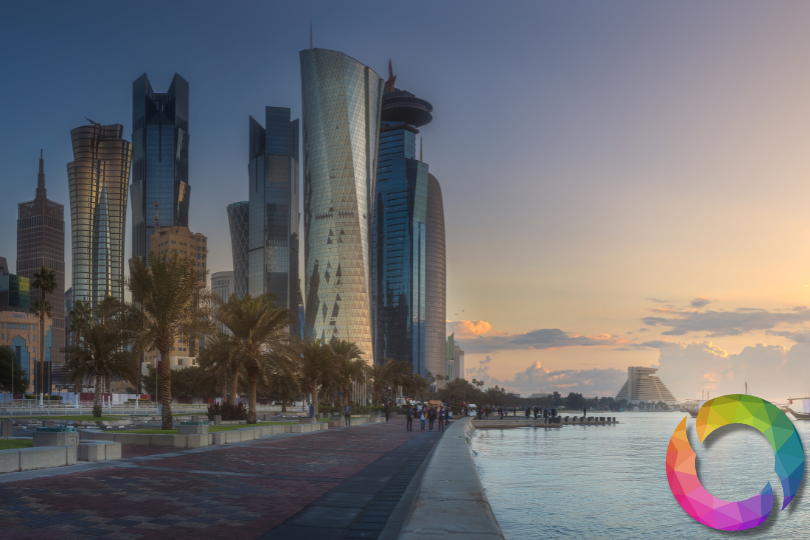Are you considering a potential job opportunity in Qatar or have accepted an offer? You’ve come to the right place!
In this article, we cover everything you need to know about living and working in Qatar, as well as some interesting facts on the country.
Climate: Qatar has a desert climate, characterized by hot summers and mild winters. Summers can be extremely hot, with temperatures exceeding 40°C (104°F), while winters are more pleasant, with temperatures ranging from 15°C to 25°C (59°F to 77°F). It should be noted that AC is available everywhere indoors!
Visas & Permits: To live and work in Qatar, you will require a residency and work permit. Your visa and required permits are organized by your employer. Generally, there is no cost to you although some employers may reclaim visa costs should you leave them before an agreed period.
Housing & Rentals: The traditional expat package includes accommodation cost, but at times your remuneration package will include an element meant to cover these costs. Qatar offers a range of housing options, from apartments to villas. The cost of housing varies depending on the location and amenities. Popular areas for expatriates to reside include West Bay, The Pearl-Qatar, and Al Waab.
Cost of Living: The cost of living in Qatar is relatively high, particularly in terms of housing, transportation, and education. However, Qatar does not impose income tax on individuals, which can offset some of the expenses.
Language: Arabic is the official language of Qatar, but English and other languages are widely spoken and understood in the country. Many other languages are also spoken due to the high number of expats in the country.
Religion, Culture and Restrictions: Qatar is a culturally diverse country with a mix of traditional Qatari and expatriate communities. The local culture is influenced by Islamic traditions, and it’s important to respect local customs and traditions. Qatar offers a range of recreational activities, including world-class restaurants, shopping malls, museums, sports events, and outdoor adventures in the surrounding desert and coastline. Alcohol is available for non-Muslims in bars, restaurants, and clubs.
Dress Code: While there is no strict national dress code enforced by law, it is important to dress modestly and respectfully, especially in public places and when visiting religious sites. One should dress modestly during the time of Ramadan to show respect for the local religion and customs. Wearing a headscarf or abaya is not mandatory.
Transport: Qatar has a well-developed transportation infrastructure. The most common way to get around is by car or taxi. Renting a car is a popular option for tourists, but you can also use ride-hailing services like Uber or local taxis. The public transportation system in Qatar includes buses and a metro system called Doha Metro, which provides convenient access to major areas in Doha.
Money and Banking: Payment is usually made in local currency and will need a local bank account – your new employer will guide you on how to open a bank account here and provide all necessary documents. All the usual banking facilities are offered (debit cards, credit cards, internet banking, loans, mortgages, etc.) Popular banks include QNB, Commercial Bank of Qatar, HSBC and QIB.
Telephone and Internet: The national and private telecom companies in Qatar provide state-of-the-art telephone and internet services. The payment for these services can be either pay as you go, or on account (providing you have a residency visa). Mobile coverage is extensive and very reliable – main providers are Ooredoo and Vodafone. On arrival in Doha, you can pick up a pay-as-you-go sim for either network.
Driving license: A local driving license will be an added benefit – carrying your home country’s drivers license will be helpful when applying for a local license and your employer will be able to provide you with an NOC letter if required. For more information on obtaining a driving licence, click here.
Qatar is known for its rich history, modern infrastructure, and high standard of living. Here are some interesting facts about the country:
- The House of Thani has ruled Qatar since 1868, following the end of the Qatari-Bahraini war. The current Emir is Tamim bin Hamad Al Thani, who has reigned over the country since 2013.
- The Arabian Oryx which was saved from extinction in the 1970s by zoos and reserves, is the national animal of Qatar.
- As of January 2023, Qatar remains the most peaceful country in the Middle East and North Africa (MENA) region for the 15th consecutive year, according to 2022 Global Peace Index – out of 163 countries globally, Qatar’s secured the 23rd spot.
- Qatar has the world’s third largest natural gas reserves and oil reserves in excess of 25 billion barrels.
- Doha’s Hamad International Airport has been ranked second in the Skytrax top 10 world’s best airports for 2023.
- The Olympic Cycling Track in Doha holds a Guinness World Record for being the longest continuous cycle path in the world, which is 33 kilometres long.
- Qatar made history with the 2022 FIFA World Cup by being the first Arab country to host the event. In addition to this, Qatar was also the smallest country ever to host it and it was the first-ever carbon neutral World Cup.
Lastly, here are some websites you may find useful:
About Flow Talent
Flow Talent have been sourcing the best Banking, Technology, Financial Services, Legal & Compliance professionals locally and internationally for leading organisations across the Middle East region since 2018.
To view our latest vacancies in the Middle East, click here.
